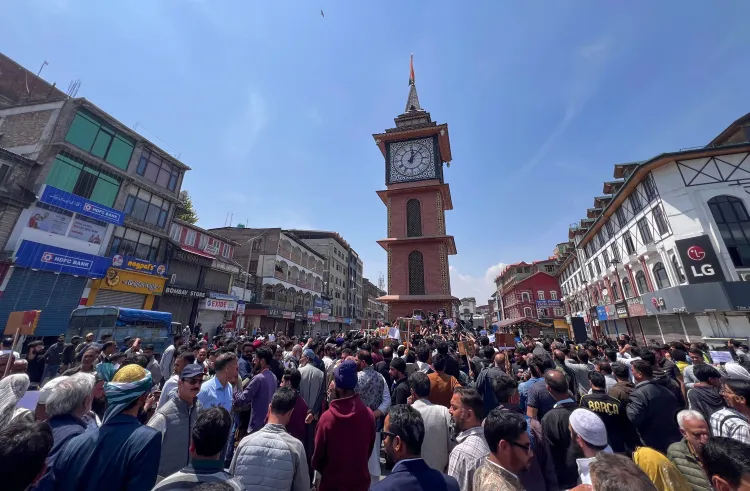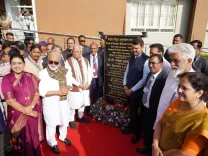Is it Time for Kashmiris to Reject Pakistan's Agenda?

Synopsis
Key Takeaways
- Pahalgam massacre reflects Pakistan's retaliatory actions.
- Kashmiris are choosing the path of peace and stability.
- The abrogation of Article 370 has led to increased economic opportunities.
- Understanding Pakistan's motives is essential for Kashmir's future.
- Unity and focus on education can help Kashmiris combat external threats.
New Delhi, June 1 (NationPress) The April 22 Pahalgam massacre was not merely an act of terrorism; it represented a calculated act of retribution. Pakistan retaliated against Kashmiris for their choice of peace, prosperity, and stability following the abrogation of Article 370.
Pakistan perceives this as an act of vengeance for Kashmiris opting for a path of prosperity and stability after the revocation of Article 370.
The Pahalgam massacre on April 22 aimed to ignite religious tensions and punish Kashmiris who rejected Pakistan's vision for them, which supports the two-nation theory.
For over three decades, Pakistan has engaged in a perilous game in the Valley. Initially, it found success. The surge of terrorism led to a reign of tyranny. Kashmiri society, once celebrated for its secular, harmonious, and conservative values rooted in Sufism, has been fractured into divisions of Hindus and Muslims, pro- and anti-India, radical and moderate.
Wrapped in religious rhetoric, the assertion of a distinct Kashmiri identity morphed into a so-called movement for 'Azadi.' The underlying agenda was clear: to radicalize the Valley and align it with the Islamic Republic of Pakistan, which has always viewed Kashmir as its “jugular vein.”
Pakistan's operatives in this 'mission' included the Hurriyat Conference and various terrorist groups. At one point, nearly a dozen terrorist factions operated in the Valley, with Pakistan promoting competition among them to be the most extremist.
Over the years, thousands of Kashmiris have perished due to terrorism, with many falling victim to terrorist acts. Numerous schools and educational institutions were destroyed.
The Hurriyat, under Pakistan's guidance, established a parallel governance system. They issued protest calendars, enforced commands, and maintained a network of stone pelters ready to act on demand.
Tourism, the cornerstone of Kashmir's economy, crumbled. Even during elected governments, instability persisted. Elections were boycotted, and most political leaders hesitated to criticize the Hurriyat or terrorist groups. Massacres and killings continued unabated.
Simultaneously, Pakistan-sponsored groups ensured a climate of fear in the Valley. Another tactic was narco-terrorism—flooding Kashmir with drugs and ruining countless young lives.
Then came August 5, 2019. The Modi-led government abrogated Article 370, splitting the state into two Union Territories: Jammu & Kashmir and Ladakh. Pakistan was taken aback. It had anticipated chaos and believed its proxies would ignite unrest across the Valley. However, nothing transpired.
Robust actions followed. Hurriyat leaders were imprisoned. Terrorists were neutralized. Ordinary Kashmiris—long oppressed by the menace of violence—began to envision peace as achievable. Commands ceased. Protest calendars disappeared. Stone pelting stopped. Youth began to focus on education, sports, and employment opportunities. Tourism rebounded, and filmmakers returned.
In recent years, the Valley has attracted over a crore tourists, including international visitors. Locals have initiated businesses and taken loans to expand in response to the tourism surge and increased demand for handicrafts.
Education is thriving. Many Kashmiris are now successfully clearing some of the country’s most challenging examinations. A vibrant sports culture is emerging, fostering a new sense of opportunity.
However, as Kashmiris embrace peace and advancement, Pakistan is desperately attempting to rekindle its failed agenda. Trained terrorists continue to infiltrate through treacherous terrain, seeking support from a small faction of both overground and underground operatives.
Yet, the widespread backing for 'Azadi' that was prominent in the 1980s and 1990s has largely dissipated. People now comprehend Pakistan's true intentions—to destabilize Kashmir through terror and drugs.
This growing awareness has unsettled Pakistan. In April, Pakistan's Army Chief Asim Munir—now promoted to Field Marshal—delivered a frustrated address at the Pakistan Military Academy in Khyber Pakhtunkhwa.
He stressed the two-nation theory, asserting that “Muslims and Hindus are two separate nations, not one” and emphasized the differences among Muslims in terms of religion, customs, traditions, thoughts, and aspirations.
A few days later, the Pahalgam massacre occurred.
India has responded both diplomatically and militarily. Yet, in Kashmir, the repercussions were immediate. Tourists vanished, and the tourism season, which had the potential to generate hundreds of crores in revenue, collapsed. This was precisely what Pakistan desired—to deprive ordinary Kashmiris of their livelihoods.
The Pakistani establishment, perhaps envious of Kashmir's flourishing tourism sector and rapid infrastructure development, chose to strike at the core of its progress.
Pakistan may believe it has derailed Kashmir's momentum. However, this disruption can be overcome by the Kashmiris themselves. The people have witnessed the horrors of terrorism and have savored the rewards of peace. Now is the moment for a decisive resolution.
Pakistan is a failed state. Its Army prioritizes profiting from chaos over serving its citizens. Every region under its control is mired in turmoil.
It is high time for Kashmiris to rise and assert two powerful words—No means no.
Let the Pakistani establishment experience the repercussions of the Kashmiris' choice for peace.
(Deepika Bhan can be contacted at deepika.b@ians.in)





